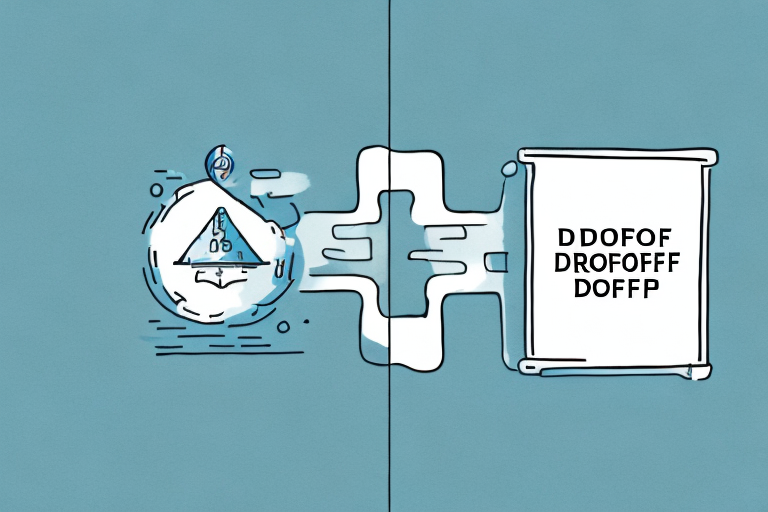If you've ever found yourself unsure whether to use 'dropoff' or 'drop off', you're not alone. These two words can be confusing, but don't worry – by the end of this article, you'll know exactly when to use each one.
How to correctly spell 'dropoff' and 'drop off'
Let's start with the basics: how to spell these two words. The correct spelling of the compound word is 'dropoff', with no space between the two parts. However, 'drop off' is also correct as two separate words.
It's important to note that the meaning of 'dropoff' and 'drop off' can differ depending on the context in which they are used. 'Dropoff' typically refers to a steep or sudden decline, while 'drop off' can refer to a variety of actions such as leaving someone or something at a particular location.
When in doubt about which spelling to use, it's always a good idea to consult a dictionary or style guide. Additionally, it's important to be consistent in your usage of these words throughout your writing to avoid confusion for your readers.
The origin and history of the words 'dropoff' and 'drop off'
Both 'dropoff' and 'drop off' come from the phrasal verb 'to drop off', which means to deliver or leave something or someone at a particular location. The word 'drop' comes from Old English and has been in use for over a thousand years.
The use of 'dropoff' as a single word is more common in American English, while 'drop off' is more commonly used in British English. The first recorded use of 'dropoff' as a single word was in the early 1900s, while 'drop off' has been in use since the 1600s.
Interestingly, the term 'dropoff' is also used in geology to describe a steep slope or cliff, while 'drop off' is used in fishing to describe a sudden decrease in depth. Both of these meanings are derived from the original meaning of 'to drop off', which implies a sudden decrease or fall.
Common usage of 'dropoff' and 'drop off' in everyday language
The choice between 'dropoff' and 'drop off' largely depends on the context in which the phrase is being used. In everyday language, both forms are used and understood interchangeably. However, 'dropoff' tends to be used more commonly in informal contexts, while 'drop off' is preferred in more formal settings.
It is worth noting that 'dropoff' is also commonly used as a noun to refer to a designated area for dropping off passengers or goods. This usage is particularly common in transportation and logistics industries, where 'dropoff' is used to describe a specific location for deliveries or pickups.
On the other hand, 'drop off' is often used as a phrasal verb to describe the act of delivering or leaving something or someone at a particular location. This usage is common in everyday language, where 'drop off' is used to describe actions such as dropping off a package at the post office or dropping off a friend at their house.
Distinguishing between 'dropoff' and 'drop off': grammatical considerations
Grammatically, 'dropoff' is a compound word, meaning that it is made up of two words that have been combined to create a new word with a new meaning. On the other hand, 'drop off' is simply a phrasal verb made up of the verb 'drop' and the preposition 'off'.
It is important to note that the use of 'dropoff' is not universally accepted in all contexts. Some style guides and dictionaries do not recognize it as a valid word, while others do. This can lead to confusion and inconsistency in written communication.
Furthermore, the meaning of 'dropoff' can vary depending on the context in which it is used. In some cases, it may refer to a steep decline or decrease, while in others it may refer to a location where something is dropped off or deposited.
How to use 'dropoff' and 'drop off' in written communication
In written communication, you should use 'drop off' in more formal contexts, such as business correspondence or academic writing. 'Dropoff' is more appropriate for informal writing, like emails or text messages. If in doubt, always stick to using 'drop off' to be on the safe side.
It is important to note that 'dropoff' is not recognized as a standard word in the English language, and may be flagged as a spelling error by some software programs. However, it has become widely accepted in informal writing and is commonly used in everyday conversations.
When using 'drop off' in formal writing, it is important to ensure that it is used correctly in the context of the sentence. For example, 'I will drop off the package at the post office' is correct, while 'I will drop off the package to the post office' is incorrect, as 'to' is not needed in this context.
Practical examples of correct usage in sentences
Here are some examples of correct usage in sentences:
- I'll drop off the package at your office on my way home.
- I need to make a quick dropoff at the post office before it closes.
- She got dropped off at the airport by her friends.
- He decided to drop off the assignment in person instead of sending it by email.
It is important to note that "drop off" can also be used as a phrasal verb, meaning to fall asleep suddenly or to stop functioning properly. For example:
- After a long day at work, I dropped off on the couch.
- The internet connection dropped off in the middle of our video call.
The role of context in determining whether to use 'dropoff' or 'drop off'
The context in which the phrase is being used plays an important role in determining whether to use 'dropoff' or 'drop off'. If you're unsure, consider where you will be using the phrase and who your audience is. Is it a formal or informal setting? Are you writing to a colleague or a friend?
Another factor to consider when deciding between 'dropoff' and 'drop off' is the style guide or grammar rules of the publication or organization you are writing for. Some style guides may prefer one over the other, or have specific guidelines for when to use each. It's important to follow these guidelines to ensure consistency and professionalism in your writing.
Common errors when using 'dropoff' or 'drop off'
One common error is using 'dropoff' in formal writing when 'drop off' would be more appropriate. Another mistake is using 'drop off' as a noun instead of a verb, as in 'I made a drop off at the post office' instead of 'I dropped off the package at the post office'.
Another error is using 'dropoff' or 'drop off' interchangeably with 'pickup' or 'pick up'. While 'drop off' refers to leaving something at a location, 'pickup' refers to retrieving something from a location. It is important to use the correct term to avoid confusion.
Additionally, some people mistakenly use 'dropoff' or 'drop off' when referring to a decrease in numbers or levels. For example, saying 'The number of attendees dropped off significantly' is correct, but saying 'The number of attendees had a dropoff' is incorrect. In this context, 'dropoff' should be replaced with 'drop' or 'decrease'.
Guidelines for using hyphens with compound words like 'dropoff'
Compound words like 'dropoff' can be tricky when it comes to hyphenation. In general, if the compound is an adjective that comes before a noun, you should use a hyphen. For example, 'a well-known author' uses a hyphen because 'well-known' modifies 'author'. However, if the compound is a verb or adverb, a hyphen is usually not necessary, as in 'he decided to drop off the package'.
It's important to note that there are some exceptions to these guidelines. For instance, some compound words have become so commonly used that they no longer require a hyphen, even when used as an adjective before a noun. Examples of such words include 'website' and 'email'. Additionally, some style guides may have their own specific rules for hyphenating compound words. It's always a good idea to consult a reliable style guide or dictionary when in doubt.
How the use of technology has affected the spelling and usage of these words
Advances in technology have led to changes in language use over time, including the spelling and usage of words. With the increasing use of text messaging and social media, the trend towards using 'dropoff' as a single word has become more prevalent. However, it is still important to use the correct spelling and format in more formal contexts.
Another way technology has affected language use is through the use of autocorrect. While it can be helpful in catching spelling errors, it can also lead to incorrect word usage and grammar mistakes. This is because autocorrect often suggests the most commonly used word, rather than the most appropriate word for the context.
Additionally, the use of emojis and emoticons has become a common way to convey emotions and tone in written communication. This has led to the creation of new words and phrases, such as 'emoji' and 'emoticon', and has also changed the way we interpret and understand written messages.
The impact of regional differences on the use of 'dropoff' and 'drop off'
Like many words in the English language, the choice between 'dropoff' and 'drop off' can also depend on regional differences. In some parts of the United States, for example, 'dropoff' is used more frequently than 'drop off'.
However, it is important to note that the use of 'dropoff' and 'drop off' can also vary depending on the context in which they are used. For instance, 'dropoff' is commonly used in the context of transportation, such as in reference to a designated area for passengers to be dropped off. On the other hand, 'drop off' is more commonly used in the context of physically letting go of something, such as dropping off a package at the post office.
Furthermore, the use of 'dropoff' and 'drop off' can also be influenced by personal preference and style. Some people may prefer to use one over the other simply because they think it sounds better or more natural in their speech or writing. Ultimately, the choice between 'dropoff' and 'drop off' depends on a variety of factors, including regional differences, context, and personal preference.
Frequently asked questions about these two words
Q: Is 'dropoff' a real word?
A: Yes, 'dropoff' is a real word, but it is a compound word that is not always appropriate to use in formal writing.
Q: Can I use 'dropoff' and 'drop off' interchangeably?
A: Yes, in informal contexts, these two words can be used interchangeably. However, in more formal settings, 'drop off' is the preferred form.
Final thoughts: Which one should you choose?
The choice between 'dropoff' and 'drop off' ultimately depends on the context in which the phrase is being used. When in doubt, it's always better to use 'drop off', especially in more formal settings like business correspondence or academic writing. However, if you're writing informally, 'dropoff' is also an acceptable form. Just make sure to adhere to proper spelling and usage guidelines to avoid any misunderstandings.





















